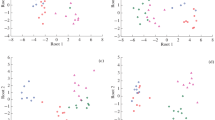Abstract
We studied the degree of plasma tryptophan depletion produced by giving normal human males different amounts of a tryptophan-free (T-) amino acid mixture. From the results of this and other studies we concluded that the maximum degree of tryptophan depletion can be produced by a 31.5 g mixture of seven essential amino acids. Administration of a T−amino acid mixture to vervet monkeys lowered tryptophan and 5-hydroxyindoleacetic acid in the cerebrospinal fluid. Levels of tyrosine and the catecholamine metabolites were unchanged. These data support the idea that the effects of T−mixture on mental function in humans which have been reported previously are due to a decrease in 5-hydroxytryptamine.
Similar content being viewed by others
References
Anderson GM, Young JG, Cohen DJ (1979) Rapid liquid chromatographic determination of tryptophan, tyrosine, 5-hydroxyindoleacetic acid and homovanillic acid in cerebrospinal fluid. J Chromatogr 164:501–505
Anderson GM, Young JG, Cohen DJ, Shaywitz BA, Batter DK (1981) Amperometric determination of 3-methoxy-4-hydroxyphenylethylene glycol in human cerebrospinal fluid. J Chromatogr 222:112–115
Biggio G, Fadda F, Fanni P, Tagliamonte A, Gessa GL (1974) Rapid depletion of serum tryptophan, brain tryptophan, serotonin and 5-hydroxyindoleacetic acetic acid by a tryptophan-free diet. Life Sci 14:1321–1329
Chamberlain B, Ervin FR, Pihl RO, Young SN (1987) The effect of raising or lowering tryptophan levels on aggression in vervet monkeys. Pharmacol Biochem Behav 28:503–510
Denckla WD, Dewey HK (1967) The determination of tryptophan in plasma, liver, and urine. J Lab Clin Med 69:160–169
Gessa GL, Biggio G, Fadda F, Corsini GV, Tagliamonte A (1974) Effect of oral administration of tryptophan-free amino acid mixtures on serum tryptophan, brain tryptophan and serotonin metabolism. J Neurochem 22:869–870
King FA, Yarbrough CJ, Anderson DC, Gordon TP, Gould KG (1988) Primates. Science 240:1475–1482
Lenter C (1981) Geigy Scientific Tables, vol 1, 8th edn. Ciba-Geigy Ltd, Basel, p 262
Moja EA, Antinoro E, Cesa-Bianchi M, Gessa GL (1984) Increase in stage 4 sleep after ingestion of a tryptophan-free diet in humans. Pharmacol Res Commun 16:909–914
Moja EA, Stoff DM, Gessa GL, Castoldi D, Assereto R, Tofanetti O (1988) Decrease in plasma tryptophan after tryptophan-free amino acid mixtures in man. Life Sci 42:1551–1556
Oldendorf WH, Szabo J (1976) Amino acid assignment to one of three blood-brain barrier amino acid carriers. Am J Physiol 230:94–98
Pihl RO, Young SN, Ervin FR, Plotnick S (1987) Influence of tryptophan availability on selection of alcohol and water by men. J Stud Alcohol 48:260–264
Smith SE, Pihl RO, Young SN, Ervin FR (1986) Elevation and reduction of plasma tryptophan and their effects on aggression and perceptual sensitivity in normal males. Aggress Behav 12:393–407
Smith SE, Pihl RO, Young SN, Ervin FR (1987) A test of possible cognitive and environmental influences on the mood lowering effect of tryptophan depletion in normal males. Psychopharmacology 91:451–457
Wurtman RJ, Hefti F, Melamed E (1981) Precursor control of neurotransmitter synthesis. Pharmacol Rev 32:315–335
Young SN, Ervin FR (1984) Cerebrospinal fluid measurments suggest precursor availability and sex are involved in the control of biogenic amine metabolism in a primate. J Neurochem 42:1570–1573
Young SN, Smith SE, Pihl RO, Ervin FR (1985) Tryptophan depletion causes a rapid lowering of mood in normal males. Psychopharmacology 87:173–177
Young SN, Tourjman SV, Teff KL, Pihl RO, Ervin FR, Anderson GH (1988) The effect of lowering plasma tryptophan on food selection in normal males. Pharmacol Biochem Behav 31:149–152
Zacchia C, Pihl RO, Young SN, Ervin FR (1987) The influence of altered tryptophan availability on ethanol intoxication in normal men. J Stud Alcohol 48:535–540
Author information
Authors and Affiliations
Rights and permissions
About this article
Cite this article
Young, S.N., Ervin, F.R., Pihl, R.O. et al. Biochemical aspects of tryptophan depletion in primates. Psychopharmacology 98, 508–511 (1989). https://doi.org/10.1007/BF00441950
Received:
Accepted:
Issue Date:
DOI: https://doi.org/10.1007/BF00441950




